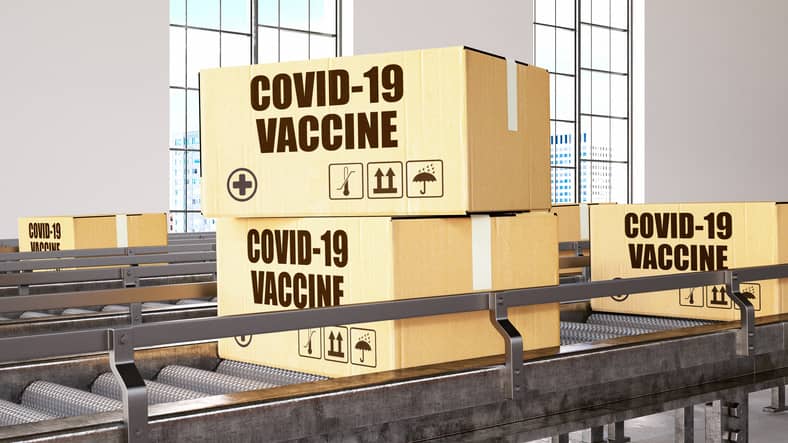Supply chain management is one of the most critical jobs in any business. Perhaps the most critical job. The best products in the world make no difference if an organization can’t deliver them in a timely manner to customers.
At its simplest definition, a supply chain ensures that a product gets from the warehouse to the customer quickly and in the condition expected. But that becomes a complicated task when considering the details of managing warehouse inventories, choosing the best transit options and dealing with unexpected issues such as severe weather or infrastructure construction.
It gets more complicated still when you consider that a single order today could mean moving something from a warehouse in Seattle to a customer in Singapore. But even the global nature of today’s economy is not the biggest challenge.
Supply Chain Competition
Businesses also are competing with other businesses, all trying to manage better supply chains. Much of this involves integrating innovative technology that can make a supply chain better able to meet customer demands. And if one organization doesn’t do it, another will.
Clearly, supply chain management today is about more than just avoiding supply chain disasters such as the one in 1999 when the now-defunct Toys “R” Us could not manage to ship all the toy orders it received by Christmas.
Now, it’s about building a more efficient and effective supply chain. Expertise is needed in the field. That’s why universities offer degrees in supply chain management. It’s also why process improvement is such a big part of the job – in fact, a recent winner of the “supply chain star” award is a proponent of Lean Six Sigma.
The Importance of Supply Chain Management
Many become aware of supply chain managers because of natural disasters. The most dramatic examples involve supply chains trying to get water, food and other resources to those in affected areas.
But it goes beyond that. For example, in the wake of Hurricane Harvey ravaging the Gulf of Mexico coast in Texas in 2017, supply chains were impacted in many ways. This included price increases, infrastructure damage, inventory levels and business activities. These impacts last for months – and in some cases, years.
Of course, many customers learn the value of good supply chains in a much less dramatic way. It happens when they order a product and it arrives late. Or, better yet, it arrives early! In either case, a customer has experienced the quality of a supply chain – something that could affect their future purchase decisions.
Job Duties in Supply Chain Management
A strong set of skills are needed to carry out a supply chain management job. Some of the typical duties of a supply chain manager cover a wide range of responsibilities.
They include:
- Developing supply chain plans that consider changes in environmental laws, infrastructure changes, local laws and regulations and the best transportation choices
- Consolidating warehouse and distribution activities that lead to more efficient supply chains
- Negotiating contracts with transit providers and other vendors
- Developing budgets that show costs for materials, inventory management and transportation
- Tracking performance of outside vendors to ensure they are meeting standards
- Collaborating with engineering, procurement and quality assurance departments to keep up-to-date on possible changes in supply chain
Duties can include these and many more, depending on the industry. But those with the expertise in supply chain management will find no shortage of opportunities.
An Example of a Supply Chain Management Job
One job listing gives a fitting example of a typical supply chain manager job. Sierra Nevada, the beer brewing company, listed a posting for a supply chain director. The overall goal in the job, according to Sierra Nevada, is getting the “right product at the right time to the right place in the right quantity at the right cost.”
That’s as good a definition of supply chain management as any.
To accomplish that goal, they want the supply chain manager to oversee capacity planning, production scheduling, material planning and procurement, order fulfillment, transportation and logistics.
They also list many essential duties that include negotiating contracts, evaluating potential vendors, developing detailed supply chain plans and maintain compliance with all regulatory standards. They also prefer candidates with a master’s degree.
Job Outlook and Pay in Supply Chain Management
Supply chain management is needed in virtually every business, nonprofit organization and government agency. That includes the rapidly growing industries of health IT and technology. Essentially, if an operation requires getting a product or materials from Point A to Point B, supply chain management is involved.
The federal government projects a 5-to-10% increase in the supply chain management field by 2026, with more than 79,000 new jobs in the field.
A job of this importance also comes with a significant salary. The median annual salary for supply chain managers nationwide in May 2017 was $105,610.
Education and Skills Needed
A bachelor’s degree is considered the entry level education needed to get into supply chain management. For those wishing to attain leadership positions in management, employers may prefer those with a master’s degree, as shown by the Sierra Nevada example above.
Many universities offer degrees focused on supply chain management. A good example of such a program is from Michigan State University, ranked the last two years as the best supply chain management degree program for both undergraduate and graduate students.
The program’s curriculum provides good insight into the knowledge and skills needed to excel in managing a supply chain. They include:
- Best practices for driving innovation in an organization’s supply chain
- Methods for developing integrated supply chain strategies
- Applying information technology innovations and data analytics to supply chain management
- Strategies for controlling the flow of materials, information and services within a supply chain
Process Improvement and Supply Chains
Process improvement also plays a crucial role in supply chain. With the constantly evolving landscape of supply chain, the strategies detailed in Lean and Six Sigma can help an operation become even more efficient.
Areas where Lean and Six Sigma have been put to use in supply chains include:
- Decreasing order fulfillment time
- Reducing the number of errors in the supply chain process
- Reducing waste in supply chain operations
- Optimizing order fulfillment
Supply chain management is a hot field. It will only become more so in the coming years. Getting the right education and incorporating the process improvement methods of Lean and Six Sigma can help make you a candidate for the best jobs in the field.



